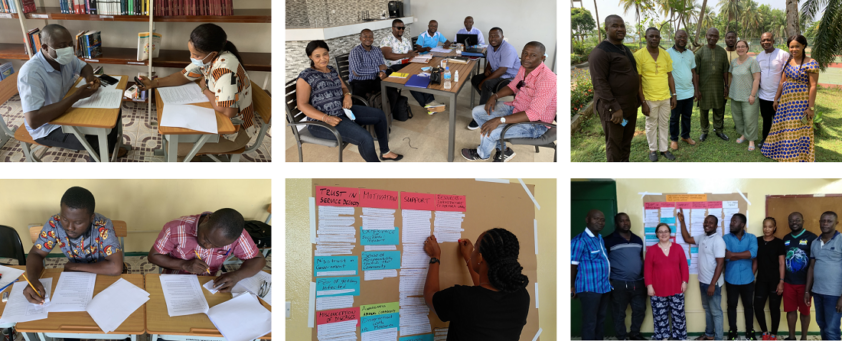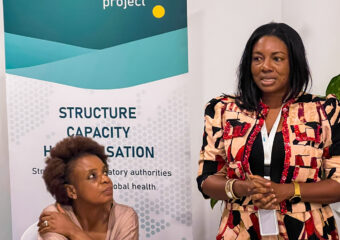Routine Health Care during Epidemics: Experiences from Sierra Leone
The ORDER-HC project conducted a qualitative study on experiences of health care providers with maintaining routine health care during epidemics in Sierra Leone. The study was implemented together with the College of Medicine and Allied Health Sciences (COMAHS) at the University of Sierra Leone.
As part of the ORDER-HC project, a team of the RKI and COMAHS conducted a qualitative study in Sierra Leone between the end of 2021 and the end of 2022. The aim of the study was to identify and analyse strategies, measures and experiences of health care providers of maintaining routine health care during the Ebola Virus Disease epidemic (2014-2016), subsequent outbreaks of Lassa fever and the ongoing COVID-19 pandemic in Sierra Leone. The study focused on the experiences of health care providers in the public health system at different levels.
Background of the study
During the Ebola Virus Disease epidemic in West Africa (2014-2016), most health facilities in Sierra Leone remained open for routine care or were able to reopen after a short period of closure. However, this was done with great challenges and many constraints. Challenges and problems were studied and documented in detail during and after the epidemic. The interest of this study was therefore in solution-oriented strategies and positive learning experiences in the health system (“lessons learnt”).
Since the end of the Ebola epidemic in March 2016, Sierra Leone has experienced several local outbreaks of Lassa fever and is also affected by the COVID-19 pandemic. However, the unique experience and efforts of the country in maintaining or restoring the provision of routine health care during the Ebola outbreak as well as during the subsequent epidemics of Lassa fever and COVID-19 in Sierra Leone have not yet been sufficiently documented and analysed. For the development of recommendations, strategies and future training content in Sierra Leone and for similar contexts, it is essential to identify facilitating factors and understand adaptive strategies and interventions that allowed facilities to maintain or resume their routine health services during outbreaks. At the same time, it is important to understand barriers to maintaining routine health care during epidemics of such high-consequence infectious diseases.
Implementation of the study
COMAHS as local research partner played a central role in shaping the research project, ensuring it considered all relevant aspects of the health system in Sierra Leone. Project staff from the Department of Community Health at COMAHS provided research and administrative assistance to implement the study. The study protocol including data collection instruments were developed jointly; the interview topic guide was piloted and further refined afterwards. Ethical approval was sought and granted by the Sierra Leone Ethics and Scientific Review Committee at the Ministry of Health and Sanitation.
A total of thirty key informants from different levels of health facilities from various Districts participated in semi-structured in-depth interviews. Interviews were recorded and transcribed verbatim.
Key questions in the interviews included: Which measures did health facilities take in order to be able to maintain routine health care services? What were their experiences with those measures? What were challenges to maintaining routine health care and what did they do to manage those challenges? What were the facilitating factors for maintaining routine health care? What are the lessons learnt from the Ebola epidemic in terms of maintaining routine health care during epidemics, and how were and are they relevant for subsequent or future epidemics, including the COVID-19 pandemic?
The research results contribute to the growing body of research on health system resilience. Initial research findings were presented and discussed in two workshops in November 2022 at the University of Sierra Leone and at the Ministry of Health and Sanitation in Freetown, Sierra Leone.
Strengthening capacities in qualitative health systems research
An important component of the ORDER-HC project is the strengthening of capacities of local partners in health systems research. In this research project, capacities in the preparation and implementation of qualitative studies were strengthened and deepened. The members of the study team had already been involved in a study conducted by the other German partner in the project – the Bernhard Nocht Institute for Tropical Medicine (BNITM). It was therefore possible to build on the knowledge and skills as well as the understanding of the overarching topic acquired there. Before the study began, refresher sessions were held for the COMAHS team, which included practicing interview skills. After data collection, the RKI conducted a four-day workshop on qualitative data analysis. The focus was on thematic analysis, the method applied in the study. Initial codes and themes identified during the workshop contributed to the further analysis.
During this study, the project team at COMAHS therefore gained further skills by participating in the activities of the whole research process: conceptualization and development of data collection instruments, collection of qualitative data and its correspondent analysis.

Date: December 2022



